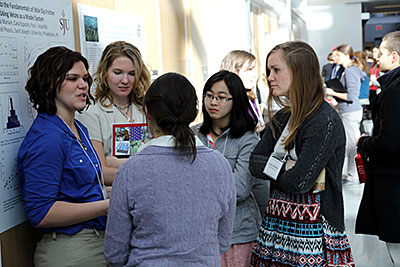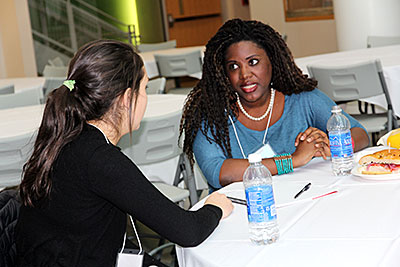Women in physics network, mentor at conference
By Anne Ju


A Cornell conference for women in physics and other physical sciences drew close to 200 participants, Jan. 18-20.
Organized by Cornell students, the Northeast Conference for Undergraduate Women in Physics was one of six events happening simultaneously throughout the U.S. About 140 female undergraduates and 40 invited guests, including speakers, panelists and faculty members, attended the Cornell event.
The conference's purpose was to support women students in physics careers in industry and academia via alumni mentoring, career and graduate school information sessions, job fairs and career development workshops.
The event's keynote speaker, Margaret Murnane, addressed how diverse teams of researchers will meet the science and engineering challenges of the century. She is a distinguished professor at the University of Colorado-Boulder who researches ultrafast lasers and coherent X-ray sources.
The agenda included two Cornell speakers. Nozomi Nishimura, assistant professor of biomedical engineering, addressed imaging cellular interactions in disease. Her current research in a lab jointly run with Chris Schaffer, associate professor of biomedical engineering, expands the use of in vivo imaging techniques to studies of Alzheimer's disease and other pathologies in the brain and other organs.
Julia Thom-Levy, associate professor of physics, whose research explores the fundamental forces and particles of nature, gave a talk on the first two years of research conducted at the Large Hadron Collider in Geneva, Switzerland. She is a member of the CMS (Compact Muon Solenoid) collaboration at the Large Hadron Collider.
Professor of physics Ritchie Patterson gave brief opening remarks to kick off the three-day conference. Patterson, who is also director of the Cornell Laboratory for Accelerator-Based Sciences and Education (CLASSE), was the principal investigator on the joint National Science Foundation/Department of Energy proposal that provided the funding for the event.
In addition, biomedical engineering graduate student Liz Wayne welcomed the participants, encouraging them to network with each other and to have confidence in their abilities as scientists.
The conference offered many activities, including the opportunity for students to give talks or present posters to practice communicating their scientific work to general audiences. At each event, Cornell faculty and staff volunteers provided feedback and advice.
The event received support from across campus, said Lora Hine, director of educational programs at CLASSE. This included donations from departments and faculty to bring in students who could not secure funding from their home institutions. The Office of the Vice Provost for Research also contributed $10,000.
"The Cornell community recognizes the importance of providing opportunities for young women interested in science and engineering," Hine said. "The organizing committee greatly appreciated all of the support we received to make this event possible."
Media Contact
Get Cornell news delivered right to your inbox.
Subscribe